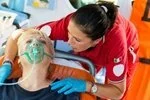Low education, poor health management increases stroke risk
The relationship between health and education has been a relatively underexplored correlation within the research community.
The relationship between health and education has been a relatively underexplored correlation within the research community. Sometimes, for an epidemic such as stroke, minimal awareness about cardiovascular health could be to blame. Spreading knowledge about how prescription medications such as Lipitor can reduce symptoms to making certain lifestyle adjustments to eliminate risk can be the keys toward achieving stroke prevention. One study in particular has focused on how poor education may be a contributing factor to increasing the chances of suffering a stroke. Danish researchers state that in addition to smoking and high blood pressure, those with face a greater risk of stroke than those with a higher education. While cigarettes and blood pressure have long been established as factors for stroke complications, the role of education has yet to be identified as a potential element until now. The researchers defined a lower education as only receiving 10 years of school or less. After separating 68,643 adults into categories of either low, medium or high education levels, colleagues discovered that 16 percent of men and 11 percent of women were considered to be at a high risk of stroke due to a combination of low education, smoking and high blood pressure. These numbers were significantly higher than those with more school experience, and regardless of blood pressure, smokers with low education had a higher risk than other education levels for enduring a stroke. Dr. Helene Nordahl, a researcher at the University of Copenhagen and lead author of the study, expressed how spreading more awareness to people who have not received extensive amounts of education might be the solution for lowering this risk. "Targeted interventions aimed at reducing smoking and high blood pressure in lower socioeconomic groups would yield a greater reduction in stroke than targeting the same behaviors in higher socioeconomic groups," Nordahl said in a statement. "Universal interventions such as legislation or taxation could also have a strong effect on stroke in the most disadvantaged. We need to challenge disparities in unhealthy behaviors, particularly smoking." Increase your awareness As for additional stroke care, taking Lipitor is a great way to help ease any oncoming symptoms of this terrible ailment. |




